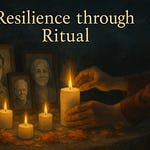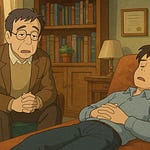In the latest Substack Live, I had the privilege of speaking with Barri Grant, a grief educator, writer, and group facilitator, about a theme that is as widespread as it is under-discussed: ambiguous loss. From friendship breakdowns to divorce and estrangement, Barri and I explored how grief manifests outside the realm of death, yet remains largely unrecognized, misdiagnosed, or pathologized in our cultural narrative. Check below for an essay based on the conversation, show notes, and timestamps.
Naming the Unnamable: Why Non-Death Losses Matter
Barri brought into focus something that clinicians and clients alike often sense but don’t always articulate: grief that lacks ritual, recognition, or even a clear name still inhabits the body and mind. Divorce, the slow fading of a friendship, or navigating the distance created by illness or caregiving often evoke profound emotional responses, but they don’t come with casseroles, eulogies, or leave from work. As Barri put it, “We don't name these non-death losses. So we don't make space.”
In psychological terms, ambiguous loss (a concept developed by Dr. Pauline Boss) refers to losses that remain unresolved, where a person is either physically absent but psychologically present (e.g., a missing loved one), or physically present but emotionally unavailable (e.g., dementia, estrangement, chronic illness, or relationship fracture). These losses are confounding because there is no closure, no clear ending, no container.
The Biology of Grief and Ghosting
Our discussion moved toward how ambiguous relational ruptures, such as ghosting, silent estrangements, drawn-out divorces, activate the nervous system. People often experience sympathetic arousal: elevated cortisol, rumination, disrupted sleep, inflammation. Even the dissolution of a once-trusted friendship can trigger physiological dysregulation akin to PTSD.
And yet, many clients walk into therapy with vague physical symptoms: panic attacks, migraines, insomnia, and are asked to tick boxes on anxiety and depression inventories, rather than being invited to contextualize their experience within recent or unspoken losses.
Barri shared a compelling anecdote: showing up at the ER with shingles during a post-separation period, her stress “wildly” manifesting in her body. The medical intake didn’t ask about emotional upheaval. “So I tell clients now: write it in. Fill it in yourself: ‘I’m going through a divorce.’ ‘My dad is dying.’ We need to say it.”
Friendships: When Attachment Isn’t Final
Friendship grief holds a particular kind of sting. The person is often still out there, on Instagram, at the same events, maybe even circling mutual friends, and the imagined future now unravels without them. That ambiguity can provoke the protest-despair cycle: yearning for reconnection, anger at the loss, bargaining with the “what ifs.”
We discussed how today's friendship culture suffers from an allergy to discomfort. The cultural norm has become avoidance through cutoff rather than renegotiation through communication. We pathologize confrontation. Ghosting becomes self-care. But in many cases, the message being sent is: “I don’t have the emotional bandwidth to deal with this,” not necessarily “You’re toxic.” And for those left behind, that lands as abandonment.
Diagnosing the Situation, Not the Self
One point I raised was the fluidity of diagnosis. What many therapists see in practice is not chronic mental illness but acute adjustment disorder: grief in response to relational shock. A blindsiding divorce, a friendship’s sudden collapse, or the role reversal of caregiving can destabilize even the most resilient. Diagnostically, this fits, but few intake forms or medical spaces ask about life context. “People don’t even know that situational diagnoses exist,” I noted. “We get stuck in binary thinking: either I’m mentally ill, or I’m fine. But mental health exists on a spectrum.”
A Return to Ritual: The Power of Groups
Barri’s experience leading grief groups underscores how rituals of community can hold the weight of unspoken grief. Her widows’ group, for example, found unexpected laughter discussing Father’s Day: a blend of release and recognition, of finally being seen. These circles create a fourth space between therapy and everyday life, one where caretakers, divorced parents, and estranged children can speak honestly without the burden of protecting others.
I added that for men especially, the mentorship model of groups like AA tends to resonate more than traditional talk therapy, which can seem emotionally performative or shame-based. In group, there’s room to dip in and out, to listen before speaking, to share wisdom rather than extract pity. Humor isn’t a distraction from healing; it’s a conduit.
Cultivating Connection in a Culture of Cutoff
The most poignant takeaway from our conversation was this: We’re lonelier than ever in an age of unprecedented connectivity. Cutoff culture, endless options, and the commodification of relationships leave us overwhelmed and disoriented. We’re primed to look for red flags, not yellow ones. We don’t know how to disagree without disappearing. As Barri put it, “We haven’t taught people how to be friends.”
But the antidote is simple, if not easy: connection and belonging. Whether in a book club, support group, or a 12-minute chat that starts as small talk and turns into something more, we need to create micro-rituals and shared spaces that hold us. “Nobody needs to do this alone,” Barri said, and she’s right.
Let’s end with that reminder: If you’re grieving something that doesn’t look like grief, whether friendship loss, divorce, caretaking, estrangement, you still deserve to be held. You still deserve a place to put it down.
If you're looking for non-death grief resources, support circles, or therapeutic tools for ambiguous loss, reach out. You're not alone.
Keywords
sambiguous loss, non-death grief, therapy, relationships, communication, community, emotional expression, support groups, loneliness, healing
Takeaways
Ambiguous losses are often overlooked in discussions about grief.
Non-death losses can lead to significant emotional distress.
The complexity of relationships can complicate the grieving process.
Divorce can result in multiple layers of grief, including loss of identity.
Therapy can help individuals process their grief and find coping strategies.
Communication is key in navigating friendships and confrontations.
Generational differences affect how emotions are expressed and managed.
Community and connection are essential for healing from grief.
Support groups provide a safe space for sharing experiences and emotions.
Humor can be a powerful tool in processing grief.
SummaryIn this conversation, the speakers delve into the concept of ambiguous losses, particularly focusing on non-death losses such as divorce and friendship breakups. They discuss the emotional complexities associated with these types of grief, emphasizing the importance of naming and acknowledging these feelings. The conversation highlights the role of therapy in processing grief, the challenges of communication in relationships, and the generational differences in emotional expression. The speakers also stress the significance of community and support groups in healing, the need for rituals in grief, and the power of humor as a coping mechanism. Ultimately, they advocate for embracing connection and belonging as essential components of navigating grief.
Titles
Navigating the Waters of Ambiguous Loss
The Hidden Grief of Non-Death Losses
Sound Bites
"We often overlook ambiguous losses."
"Divorce can result in multiple layers of grief."
"The loneliness epidemic is a growing concern."
Chapters
00:00 Understanding Ambiguous Losses
01:48 The Complexity of Non-Death Grief
04:08 Navigating Grief in Relationships
06:10 The Impact of Divorce on Identity
08:28 The Role of Therapy in Grief
10:29 Communication and Confrontation in Friendships
12:17 Generational Differences in Emotional Expression
14:21 The Importance of Community and Connection
16:05 Finding Support in Group Settings
18:07 The Need for Rituals in Grief
20:08 The Power of Humor in Healing
22:24 Building Resilience Through Connection
24:20 Conclusion: Embracing Vulnerability and Belonging














Share this post